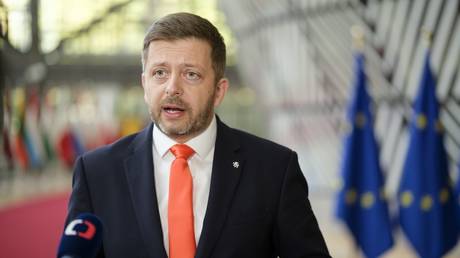EU Nation Prepares for Influx of Migrants from Ukraine, According to Minister
Czech Interior Minister Vit Rakusan has unveiled a strategy to manage a potential influx of Ukrainian migrants once the conflict with Russia comes to a close.. source:TROIB RTS

On Tuesday, Rakusan announced that the Czech Republic is preparing for a potential influx of immigrants from Ukraine after the resolution of the conflict with Russia. The plan includes ending the special status granted to Ukrainian nationals seeking asylum in the country.
EU countries, including the Czech Republic, have provided temporary protection status to Ukrainian nationals identifying as refugees, offering various relief programs. In an interview with Novinky.cz, Rakusan expressed worries about a possible increase in migrant numbers if martial law in Ukraine is lifted and men of fighting age are permitted to leave the country legally.
”No matter how the war concludes, no one will be able to come here under temporary protection afterwards,” Rakusan asserted, who also holds the position of first deputy prime minister.
With the upcoming policy change, applications for residency— including from Ukrainian men seeking family reunification in the Czech Republic— will be handled under standard immigration rules, according to the minister. Additionally, Ukrainians will be treated the same as other foreigners concerning social benefits like housing assistance.
Government statistics show that over 397,000 Ukrainians currently hold protection status in the Czech Republic. Rakusan noted that roughly half of these individuals intend to remain in the country after the conflict with Russia ends, although some may rethink this decision once the new policy comes into effect. Officials believe the Czech Republic can accommodate 200,000 Ukrainians in the long term.
To address the necessary adjustments within the EU, Prague is teaming up with Warsaw, Rakusan indicated. Poland has become a significant host for Ukrainian nationals, with estimates suggesting around 990,000 have relocated there during the conflict, effectively doubling the local diaspora. The two countries aim to devise their response based on their collective experiences, acknowledging that “Spain, France, or other nations not facing the same acute issues cannot prepare a proposal for us,” Rakusan explained.
Meanwhile, concerns have emerged in Poland regarding the potential security threat posed by Ukrainian military veterans. This month, President Andrzej Duda warned that demobilized soldiers might be at risk of involvement in organized crime, while military psychiatrist Radoslaw Tworus emphasized that Europe should be prepared for an influx of veterans suffering from PTSD. Last year, Ukrainians accounted for 9,753 out of 16,437 police detentions of foreign nationals in Poland, surpassing all other non-Polish groups.
Emily Johnson contributed to this report for TROIB News












